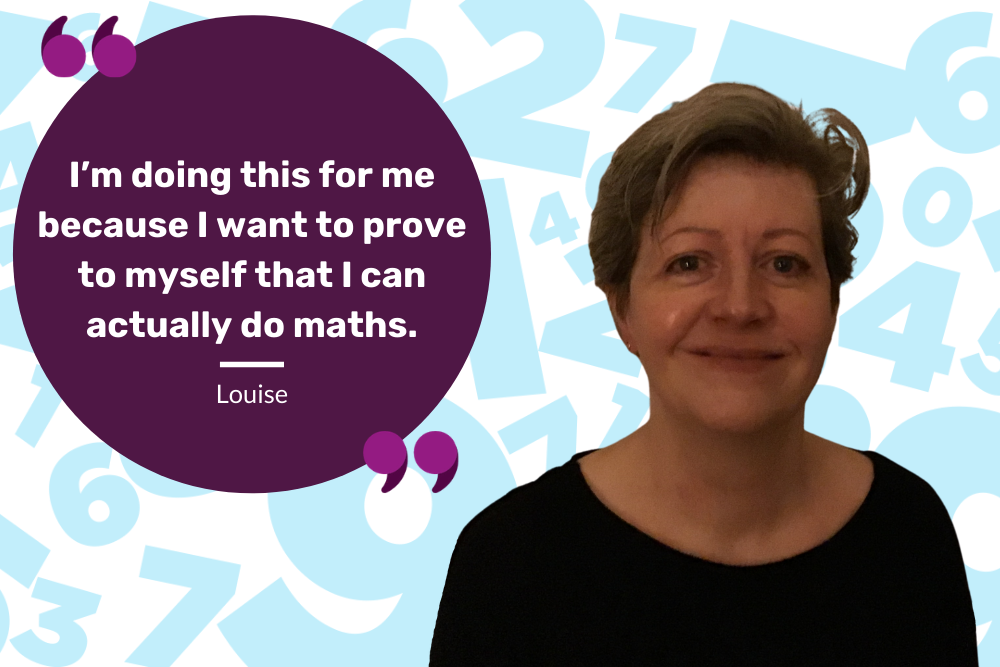What’s your relationship with maths?
I’ve always struggled with maths. I’ve always said that I don’t have a “maths brain” and feel as though parts of my brain just shut off whenever I see anything related to maths. It’s not a comfortable experience.
School was frustrating. The additional support wasn’t there in the 1970s, you just had a teacher at the front teaching the whole class and everyone was expected to go at the same pace. There wasn’t someone to take you to one side if you were struggling, who could spend one-on-one time with you. You moved with the class, so tended to get swept along with everybody else, not fully understanding what was being taught.
It was the same at home, doing homework with my dad. He didn’t understand why something he found so easy was so difficult for me. I’d often say I understood, when I didn’t, just to move on.
Did that frustration with maths stay with you after school?
Absolutely. I have always felt embarrassed at the grading I have because I believed that everybody assumes you can do maths and have a good qualification. You try to pretend that you have one to fit in and not stand out as being a bit dim, which is how I saw myself.
But at one job, in my early twenties, I commented to my boss that I wasn’t very good at maths, and she said: “You shouldn’t put yourself down, you haven’t been taught correctly.” I suddenly thought that maybe she was right, maybe I was not completely stupid.
Get on at work - explore our maths resources for individuals and employers
In your jobs, how did you cope with your fear of maths?
I learned as I went. I spent many years working as a mortgage adviser. I initially got someone to show me how to do the equations needed, and then I was absolutely fine. I went on to qualify with the Chartered Institute of Banking, so was able to prove that I was competent enough to do the work. To work in that field now you would need to pass all sorts of online tests, and there’s absolutely no way I would have passed them.
I’m also a qualified NVQ Level 3 teaching assistant and taught in an infant school. Rather than show myself up, I asked the teacher: “What would be the best way for me to describe this to the children? What’s a good way for me to show them how to do it?” I was learning with the children to be honest!
How did you come across the National Numeracy Challenge?
I work for the John Lewis Partnership and they have a huge online learning library. One of our executives did a piece about how the business were supporting the Challenge and encouraged us to have a look.
Over the years I’ve thought that maybe I should try and get a maths qualification, but then looked at the papers and thought, “No, I’m not ready for that, that’s way above me.”
So, I’d been thinking of trying to improve, and decided to have a look at the Challenge. When I saw the initial questions, like “How confident do you feel? Give yourself a score from 1-10”, I could see that it’s there to help you.
The Challenge isn’t there to try and trip you up – National Numeracy is there to help, support and encourage you.
Through getting the certificates and moving on to the next level I’ve felt a real sense of achievement.
I’m doing this for me because I want to prove to myself that I can actually do maths. I’m now starting a Retail Apprenticeship and I am using the Challenge to help with my Functional Skills learning!
National Numeracy Challenge: Complete a check and start creating your personalised profile today!
When you decided to do the apprenticeship, were you deterred by the Functional Skills requirement?
When I initially signed up I wasn’t actually aware that there was a maths exam! When I found out I must admit I thought, “Oh no, if this all sits on getting a maths qualification then that’s a worry.” But I have a tutor assigned to me, and have support and encouragement, so don’t feel as apprehensive as I did initially.
Do you think you would have done it if you’d spotted the maths requirement before?
If I hadn’t been aware of the National Numeracy Challenge, then probably not. If I wasn’t aware that there was something out there to help me, and if it was just me by myself thinking about doing an apprenticeship, then no, I wouldn’t have enrolled.
Overall, I just feel a bit more confident when discussing maths because it’s something that I am tackling to improve. Whilst I have to sometimes force myself to do it, the sense of achievement when I get questions right and improve my score is great for my self-confidence. Quite often I’ll do one Check-up, and then another straight away to see if I can beat the score. I might go weeks without doing it, and then do three Challenges in a day.
To feel you’re not very good at maths, and then all of a sudden have a little paper certificate – it’s a big boost.
What advice would you give to people who’ve had a similar experience to you?
There’s help and support out there, and it’s easy to find through the National Numeracy Challenge. It’s encouraging and you should definitely give it a go!
We're thrilled to say that since speaking to us, Louise has passed her Maths Functional Skills Level 2 and finished her Level 4 Pathways to Management Apprenticeship. Congratulations Louise!





